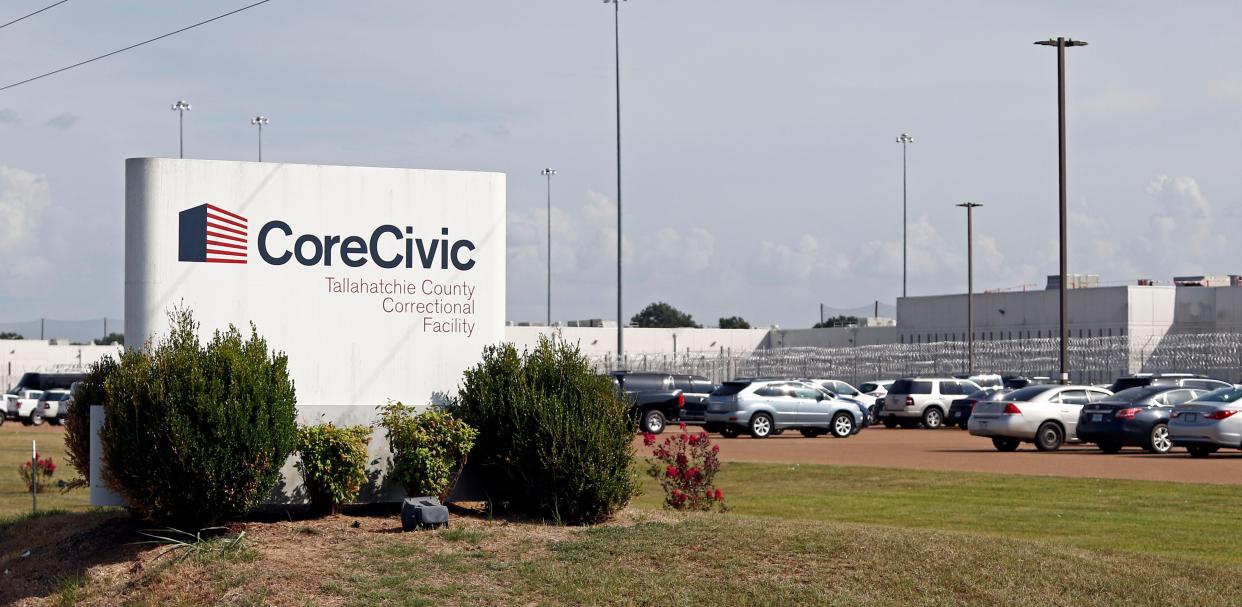Private prison operators go ka-CHING while catastrophe awaits Arizona's schools

Corrections & Clarifications: This story was updated to reflect the most recent data from Arizona Department of Corrections on the average per diem cost for public prisons.
Two years ago in his State of the State speech, Gov. Doug Ducey announced he’d be closing the prison in Florence in order to save the state money.
Last week, The Arizona Republic’s Jimmy Jenkins reported that the state is transferring more than 2,700 Florence inmates to a private prison in Eloy, at an increased cost to taxpayers.
This, while Arizona has more than 4,000 empty beds that could house those moderate- and high-risk inmates in existing state-run prisons.
It seems all those free drinks and the record-high campaign contributions the private prison industry has doled out to Arizona’s Republican leaders have paid off.
CoreCivic will get more cash per inmate
Not only will the state pay CoreCivic $85.12 per inmate per day over the next five years — an increase from the average $78.18 to house an inmate in a state-run prison, according to the Department of Corrections — it’ll also guarantee the company's private prison in Eloy will have a minimum 90% occupancy rate, according to the contract.
CoreCivic says the transfer will be boon to inmates.
“The individuals that will be transferred to our La Palma Correctional Center will have immediate access to life-changing reentry programming, and we have a strong track record of providing these services," Ryan Gustin, the company's director of public affairs, said in a prepared statement.
The deal's not so bad for CoreCivic either.
Jenkins reports the five-year contract, signed last month, is worth more than $420 million, with CoreCivic raking in more than $6 million in profits in the first year alone.
And, oh by the way, the company “may be eligible to receive consideration for an annual cost adjustment ... subject to approval of funding and authorization.”
May be?
With a huge surplus in the state treasury, expect to see CoreCivic and other private prison operators bellying up to the taxpayer trough. And expect to see legislators, always eager for another campaign handout, ready, willing and able to overserve them.
Last year alone, Republican legislators, on a partyline vote, approved a $43 million boost to private prisons.
Company has not been shy with donations
This, after (because?) the industry spent the previous few years doling out a record amount of campaign cash and plenty of free food and drinks to Republican legislators.
According to an Arizona Republic/KJZZ investigation last summer, CoreCivic and GEO Group, the state’s two biggest private prison contractors, spent $23,910 feeding and watering legislators since 2016. They, along with select employees, spread around another $60,918 in campaign contributions, much of it in 2019 and 2020.
And in 2021: that completely coincidental $43 million boost in spending on private prisons.
To absolutely no one’s amazement, a spokesman for CoreCivic last summer strenuously denied that the company’s spending on lobbying or campaign contributions resulted in any special treatment.
“CoreCivic’s political activities are transparently reported and consistent with all relevant laws,” Ryan Gustin, public affairs manager for CoreCivic, told reporters. “The influence over the procurement process suggested ... is illegal, and we consider any statement along those lines false and defamatory.”
Says the spokesman for the company that just scored a $420 million five-year contract – which, by the way, CoreCivic will have the opportunity to extend for another five years.
Can students get that kind of help?
Meanwhile, Arizona’s public schools remain some of the most underfunded in the nation. And now, they're now facing the prospect of catastrophic cuts by April 1 unless the Legislature lifts a 40-year-old spending limit so they can spend the money they do have.
A spending limit they are loathe to lift because doing so would allow a voter-approved income tax on the rich to take effect. This, to better fund schools.
If only our kids could pool their allowance to wine and dine our esteemed leaders.
Reach Roberts at laurie.roberts@arizonarepublic.com. Follow her on Twitter at @LaurieRoberts.
Support local journalism: Subscribe to azcentral.com today.
This article originally appeared on Arizona Republic: CoreCivic private prisons score big while Arizona schools starve

